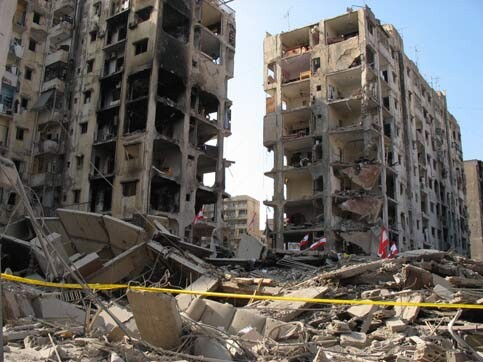Beirut 15 August 2006

Bomb devastation in southern suburbs of Beirut, 15 August 2006. (Marie Claire Feghali/RIN)
Two days ago, my mother and I watched a building disappear.
We had been taking a walk around our house in a mountain above southern Beirut when we saw it - the mad cluster of life, mediated through concrete buildings of different heights, starting at the coastline and spilling inwards. The city. It lay there, exposed. At first it was difficult for my American mother to discern where Beirut “proper” ended and its southern suburbs began. It all looks the same from a distance, especially from an elevated one.
Then we noticed the smoke - that white and black substance that marks the battlefield between fire and oxygen, rising in circles above a section of buildings. Thicker than mist, more refined than fog. The different billows of smoke were so close together that higher in the air they intertwined, drawing a clear line between their anger and the calm of the pink sky. It was, by then, sunset. My mother, highly trained in this type of mapping, pointed with her index finger at these signs of death and said one word:
Dahieh.
We stared at the smoke, silently mourning the loss of life it was announcing. We did not hear the vibrating approach of a plane. We did not see the arrogant posturing of a warship. The sky and the sea were clear. But then, suddenly there was another explosion. There was no sound, and we would not have seen it if we had not already been standing, fixated by the smoke’s message. The explosion unfolded in silence, quietly and impatiently replacing our view of a patch of buildings with a ball of fire. My mother gripped my shoulder as the sound now reached us, the rumbling satisfaction of “mission accomplished.” Another patch of buildings was engulfed in flames, disappearing instantaneously into red. Another sound made its way towards us. My mother’s fingers dug into my shoulder, and I felt pain.
This was almost twelve hours before the so-called ceasefire took effect. The State of Israel left many of these parting gifts on Lebanon’s now pockmarked landscape. Frustrated, angry, and incredulous that they could not achieve their military objectives, Israel has rediscovered the concept of a UN resolution. Provided, of course, that the UN resolution speak to Israel’s concerns and objectives. The United States has not only delivered emergency weaponry to Israel, it has also added UNSC 1701 to its ally’s arsenal. With it, they smile smugly at the camera, weighing the lives of two Israeli soldiers with that of 1100 (and counting) Lebanese civilians.
But let us be clear: this diplomatic assault is not only against Hezbollah, their supporters, or even Lebanon. It is against the very concept of resistance. That is why Arab heads of states are supportive of its ethos, and that is why all people with a humanitarian conscience should be against the complete implementation of UNSC 1701. We should not have to give away diplomatically to what could not be won militarily. We should not acquiesce to a logic that says that in order to “buy” a ceasefire, and with it time to deliver humanitarian assistance to the needy, to relocate the almost 1,000,000 people who were forced out of their homes by the Israeli war machine, and to dig out the dead bodies from under destroyed houses, bridges, and cars, this logic that we have to “sell” our rights to freedom from occupation, dignity, and self governance. Yes, I said self governance, for it is UNSC 1701 - written and decided on by the US, Israel, France, and their Arab friends - that violates Lebanese sovereignty as it duplicitously claims to rescue it from other Lebanese. This UN resolution aims to determine Lebanese internal politics for the foreseeable future, and through it, the US and its (diminishing) internal Lebanese allies close one eye, open the other, and pretend see, and speak in the interest of all of Lebanon.
Finally, we, the oppressed peoples of the world, should never be forced to relinquish that final right that infuriates the Israeli army (and others like it) and pushes it to commit war crimes: self-defense.
We should not allow the United Nations to be turned into a weapon, especially by those who are given immunity, time and time again, from that same body’s decisions regarding Palestine, Palestine, and Palestine.
Now a new round of waiting begins.
Maya Mikdashi is a graduate student at Columbia University. She is also co-director of the award winning documentary film About Baghdad.
Related Links



